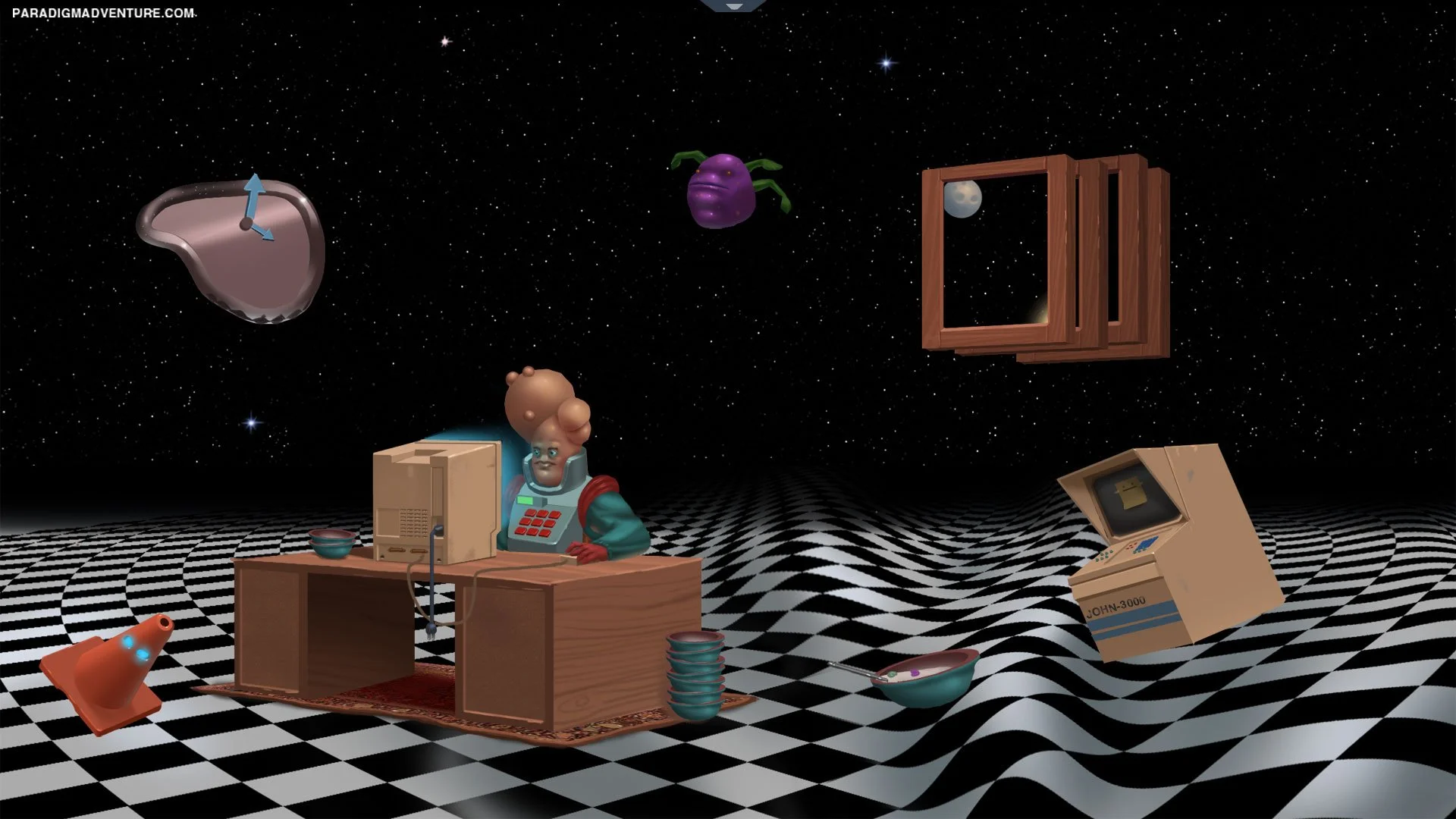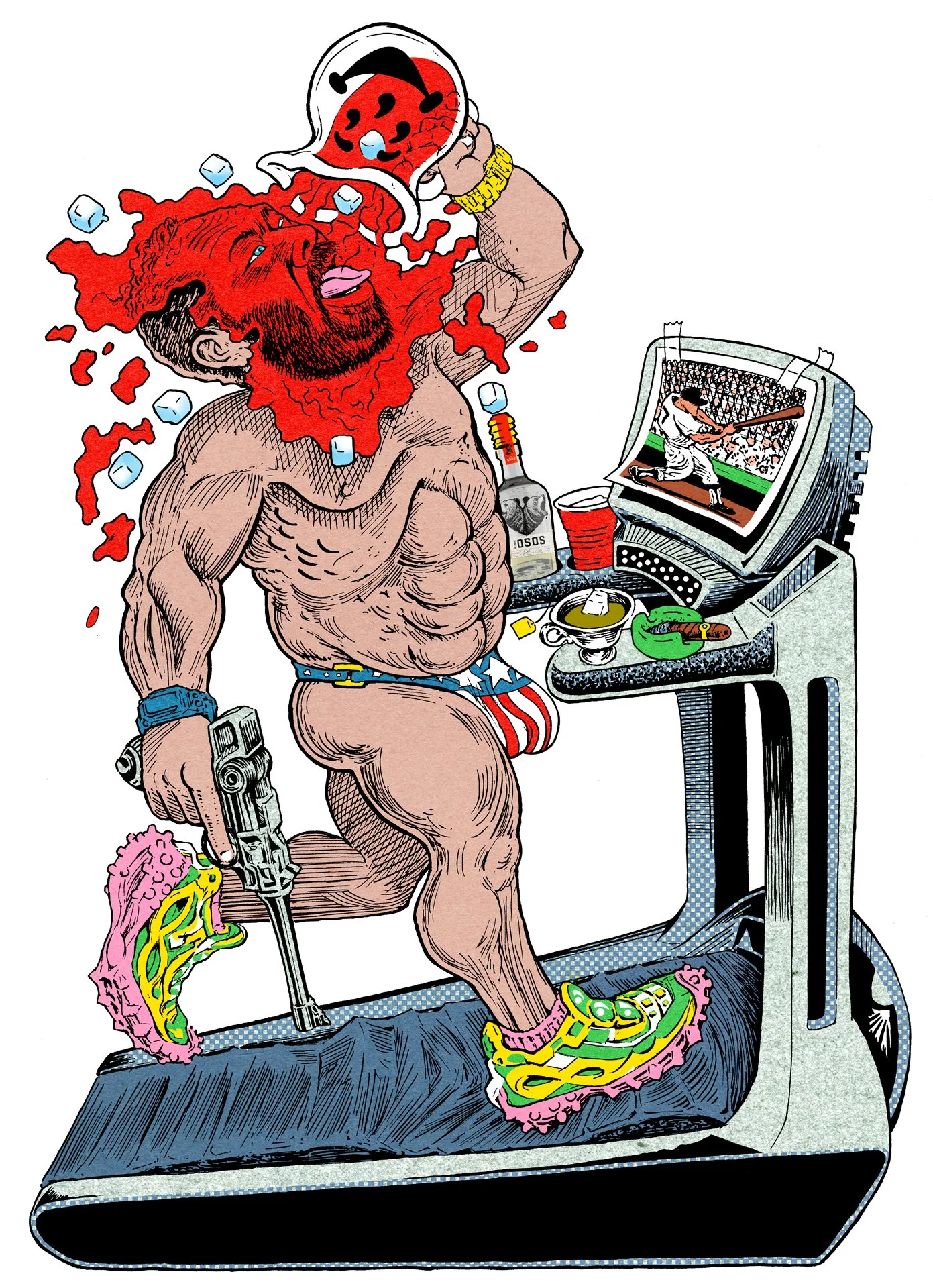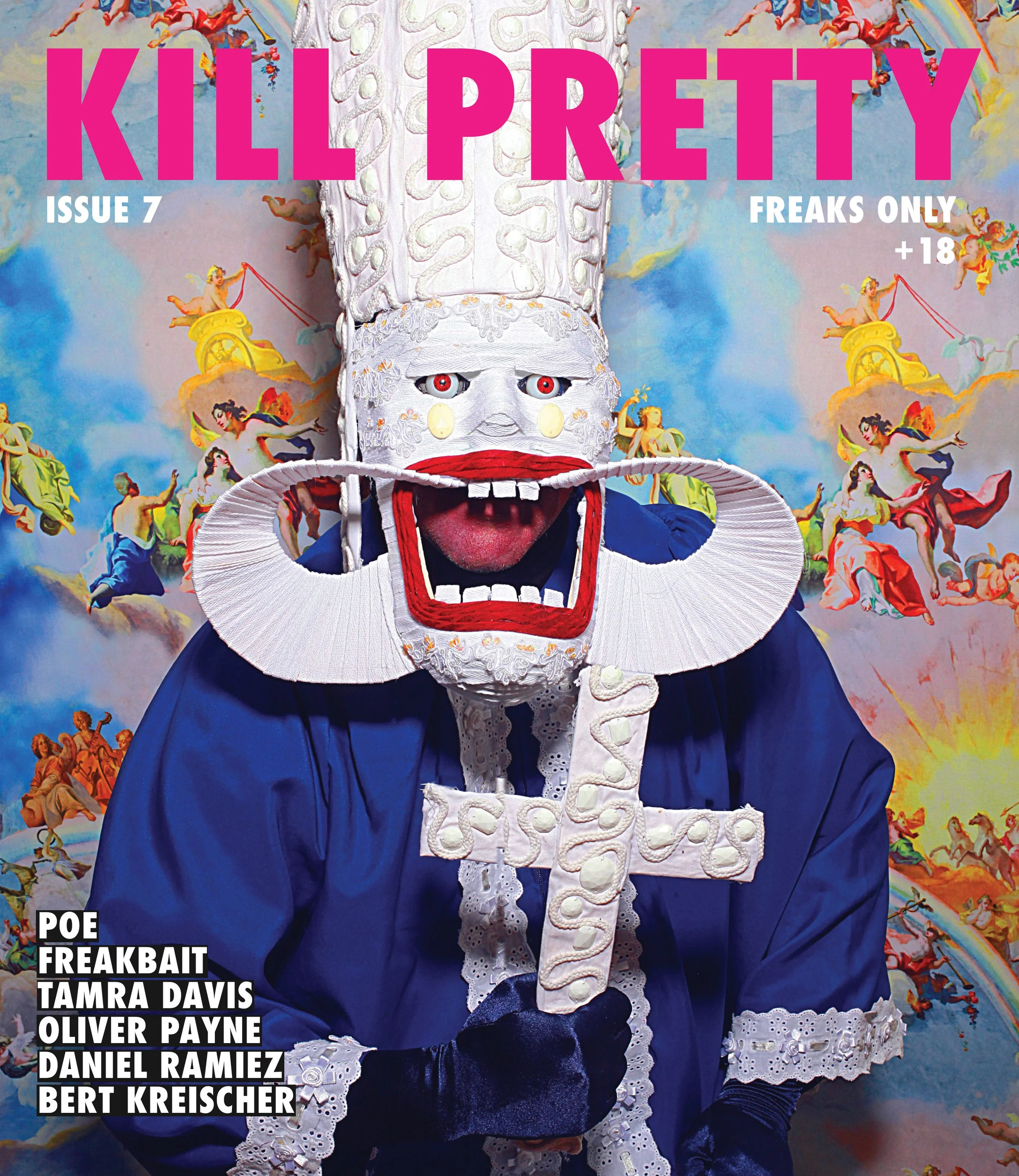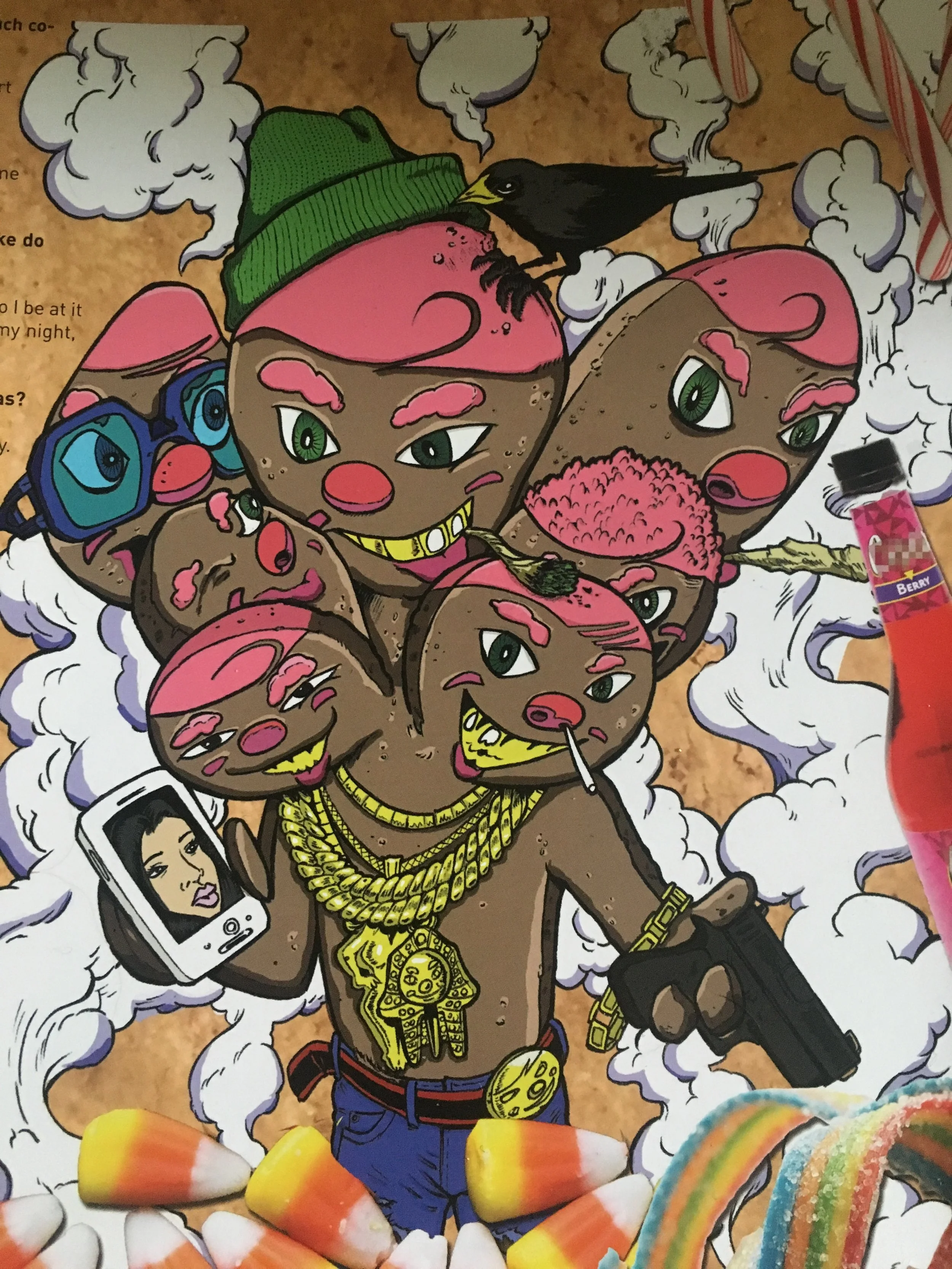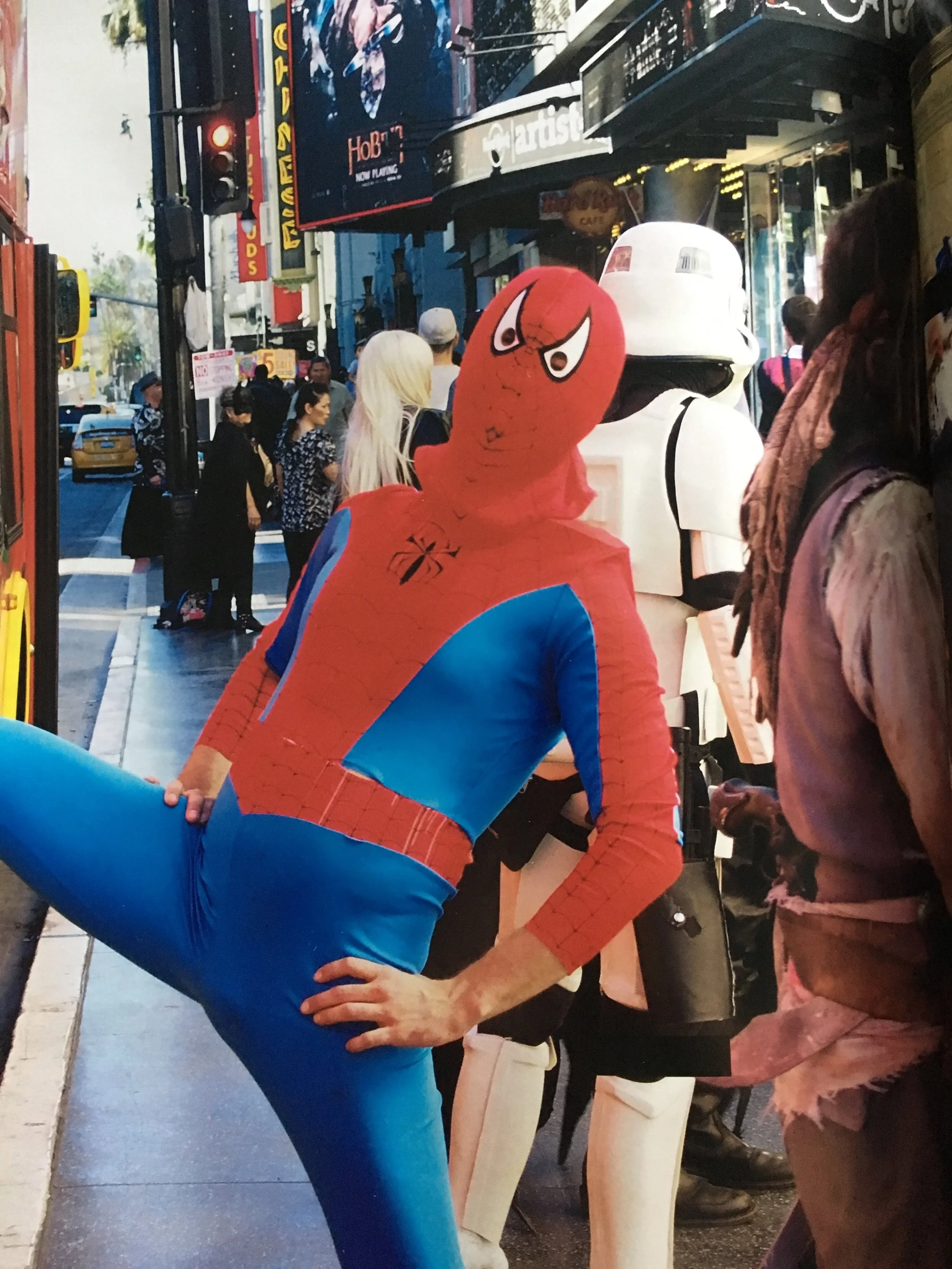We interviewed Duncan for 14 pages in issue 3! Buy it here!
Kill Pretty: Do you remember the first time you did a hallucinogenic?
Duncan Trussell: The first time I did a hallucinogen, I was in high school and it was a dose of some kind of white blotter; I don’t know exactly what kind it was. It seemed like the quality of the LSD was actually pretty good, especially for Hendersonville, North Carolina. Very clean and a wonderful trip. I’d been excited about taking LSD for a long time. Some of my friends had been doing it and they had told me all their cool stories. I remember in my friend’s trailer he had one of those, you see them in hotels when they say there’s a hot tub in the room, but it’s really just a big bath tub; his trailer had one of those. It was his moms trailer. I was sitting in there as the LSD started kicking in and Star Wars was playing in the background. That strange sort of echoey, acoustic hallucination that can happen on LSD started happening. The first thing I noticed was the auditory component. It was a light saber fight and all of the sudden the sound of the light sabers seemed so interesting. Then I realized, “Oh this is it. I’m starting to trip. This is the thing people are talking about.”
Then I laid in the grass as my friends jumped over me. I was laughing so hard and the world was so beautiful. That’s the gift of psychedelics, they reintroduce you to the world. Generally most people do with the world what they do with relationships, they take it for granted. A lot of people talk about how over time a relationship will cool down and you’ll stop having sex. You won't be as passionate about the person any more. That’s the exact same phenomena that happens in life. Over time people feel like life has become less interesting. Their relationship with life cools down. Inspiration is the orgasm that comes from living a full life. So your inspiration orgasms begin to diminish in a similar way that your relationship orgasms begin to diminish in a stale marriage. Your inspiration drops, you get depressed, you start taking antidepressants and you try and fix your problem. A psychedelic can very quickly rip away a layer of conditioning or boredom that you have placed over the world to keep you safe. Suddenly you’re reunited with that vibrant, glorious life that exists in all things and suddenly you realize it wasn’t the world that stopped being interesting but rather the membrane or sphere that you built up over the course of your lifetime was creating a kind of condom effect.
KP: Earlier this year, I took 5.5 grams and got stuck in a time loop where my memory kept refreshing, I didn’t know where or who I was, and existence didn’t make sense to me. Have you ever had anything like that happen?
DT: I’ve had challenging trips for sure. The closest I’ve ever come to that experience was way back when I can remember inhaling butane gas. Just huffing gas out of a bag. This was in high school, I was up in my bedroom and my poor mom was downstairs completely oblivious to the fact that her son was sucking back industrial fumes. So fucking horrible. If you do a dangerous chemical the fault is solely on your own shoulders and any repercussions that come from it are completely on you. That being said the prohibition on drugs ostensibly to keep our sweet darling children safe can have quite the opposite effect. There’s a natural innate curiosity that exists in teenagers that leads them in the direction of having these psychedelic experiences. In indigenous cultures, this is something that becomes ritualized as a coming of age, where they give you Ayahuasca or some other shamanic plant medicine so you can go into the spirit world and find your true nature. In the west, what people do is they look through the dresser drawers of their kids from time to time and they find marijuana or acid and they freak the fuck out, “Your life has been destroyed!” When really, what’s happening is an innate, natural curiosity inside human beings to expand outside the limitations of their own objective identity trap and that’s what psychedelics are there for and the prohibition ends up driving idiots like me to try awful, awful substances. God knows what that could have done to me. Thank god I didn’t die, but anyway, all that being said, I was inhaling this fucking gas, and I remember having this experience of suddenly being on a number line, like I was literally on some kind of awful number line, zooming toward the zero point; and I knew when I got to that zero point I would cease to exist. and I was suddenly in that point and I realized that for the rest of infinity, I was consciousness without form, completely trapped, unable to articulate myself, or to change condition, I was just in a state of pure and absolute chilling emptiness. It was this sort of existential nausea. It was like having all forms of blackhat Jean-Paul Sartre-level existentialism just injected into my brain without knowing those words. I was experiencing the essential truth of all things, which is that we are completely empty and devoid of any kind of permanent self. But because I hadn’t come in contact with any of those kinds of teachings, I was just like I’M IN HELL! So that was kind of like what you experienced…
KP: It’s funny, that is actually pretty similar to what I experienced, that was a good way of describing it. It’s weird without having any memories of the universe; when everything is gone, your brain starts just connecting random things together and forming these concepts that don’t make any sense.
DT: Well this is why I think it’s really important to pair your psychedelic practice with a meditation practice that involves a kind of consistent studying of some kind of philosophy or scripture or spirituality; something that has a transcending quality to it. It doesn’t have to be religion, it could be poetry or just something that has that “other worldly quality.”
Think of the transcendentalists, I like buddhism right now, or even like Ram Dass, any type of bonafide eastern teaching. If you study those and then take a psychedelic responsibly, the library the psychedelic invites you in. The books inside that library are information packets that come to you in the form of these epiphanies that can be really confusing and frightening, [but then] become at least a little bit more legible, so that you have some kind of map for where you’re at. You could say, when you find yourself in that place, your mind is no longer connecting with these symbol systems you’ve created. In other words, when the wings get peeled away that has on it a type of Terminator grid you’ve been looking at the world through, [once it’s] gone, you might be able to refer to some of those teachings, and in some way, it diminishes the anxiety you’re experiencing. Which is [mostly] from getting a lot of truths [all at once] that maybe you weren’t prepared for.
KP: It’s hard to find something that fits in the right way that really pulls it all together. I guess nothing ever will perfectly, but I always like announcing my intentions before a trip, or keeping certain things in mind before a trip.
I think anyone who’s tripped before won’t disagree that when you go outside during a trip, weird shit seems to happen. For some reason, that’s always the moment in time when you run into a dude with one eye or something.
DT: I was just about to tell you! Whenever I’m on psychedelics I will encounter a person with some kind of really extreme disability, or some other form of powerful physiological imbalance… that’s irreversible and they’re probably not gonna get “better.” I think that’s a gift when you see that. I love the model of the universe that we’re not just in the the universe but we’re in the university, and everything happening around us is part of this advanced class. A lot different people have different ways of phrasing this. And when I say these things, I’m not saying them as in I believe that’s where we are, I’m saying it in the sense that, this works really well as a handle that I can use to move ideas around. That’s really what I love about the concept of chaos magic; that you’re allowed to use any symbol that you want to achieve certain states of consciousness, and you don’t have to reject certain symbols because they seem meaningless or because so many other people have used those symbols in certain ways. For example, the symbol of Christ, Jesus Christ. Whenever I hear people arguing over historical realities of Jesus, I’m like, that is WAY off track, [and] way different than my understanding of this symbol, because to me, it’s completely irrelevant whether or not there was a Jesus Christ, and it’s completely irrelevant what that Jesus Christ was like, but, I can use the symbol of the crucifix, I can use the symbol of the god man being beaten by people, I can use all those symbols to help open myself up a little bit. The people I know [doing] chaos magic [though], use symbols that are way more modern. Like Batman for example, as a metaphysical, symbolic tool to help them focus their mind to a higher state. I think it’s really important to realize that you don’t have to believe in the historical facts or the reality of any mythological figures, you could use X-Men characters just as easily to try and help yourself up.
I love the idea that this is a University, and anything that’s a burden to your life is actually a holodeck style of teaching. There’s a wonderful philosopher and author named Robert Anton Wilson, and he wrote some great books; in one of these books he talks about the crazy idea that we could actually be existing in another galaxy right now, in a completely [different] part of the universe, and our entire experience of reality is being projected into our minds by super advanced computers as a form of training because what we are is very powerful, so before [we can be] released to be our own gods, we have to go through this series of incarnations that we [identify as] “human existence,” until we learn the great lesson, or truly awakened or something.
With that being said, coming to contact on psychedelics with a vision of a person with one eye, or a person who is disabled, or a person who is incarnated in a body that is not working in the same way that the majority of people’s bodies are working, I think that that’s being given to you as a teaching, something to contemplate, a kind of “koan” [parable story]; something to ruminate over. What it means to each person is going to be completely different, but I think those things happen for a reason.
KP: One thing that I was kind of getting at was, I’ve started to feel like that is kind of a connection to novelty theory, that when you’re taking a psychedelic you're having this extremely novel experience, and that extremely novel experience is creating other novel experiences around it.
DT: Yeah! You know, when you say you’ve been taking a psychedelic you’re having a novel experience, I say, when you’ve been pushed out of a vagina into a dimension where you’re being pummeled by the gravity well, by the weight of a gigantic mass of rock and lava and water, and above you at all times is this glimmering, glittering tapestry of suns and stars, and also around you are these clouds of particulates that have somehow become sentient, given themselves names and social security numbers and apparently attaching you to all these clouds of particulates or are nano tubules that are constantly sending quantum information through invisible webs that I don’t think scientists have caught up with it yet; shamans have caught up with it, but I think once you realize that’s where we’re really at, the overwhelming aspect of this “thing” we’re in, causes us to turn away from those kinds of thoughts, [so we] build an existence inside of materialistic ideas by clinging to the [concept] of the “little self” we think we are. That’s how the spiritual callous we call our ego begins to form, which is totally fine; but when you take a psychedelic it’s not that this [experience] is novel, it’s showing you that “everything is novel!”
KP: One thing that I was thinking recently about you, that I find interesting is, when someone takes the place of a teacher, just trying to talk about things and teach people about stuff, a lot of people take this high and mighty stance where they can’t be touched, but you let people know that you’re not some “all-knowing-super-smart-perfect-being.” That you too, get stuck playing video games for hours at a time, and you’re not always meditating when you wish you were, that you’re just like everyone else. It feels like a very conscious choice to put yourself out there in that way, is it true?
DT: Yeah, I think it’s very important to make sure I put out there that I don’t think of myself as a teacher and I know that I’m not. I’ve met teachers, I’ve met real teachers. Because of the podcast I got to hang out with Ram Dass, and forgive me for spiritual name dropping, I’m only doing it to illustrate that I’m well aware there can be teachers and they do exist and I’ve gotten to meet them, but when you get around someone like Sam Cornfield, you see they’ve done the work, like ...he was a monk! In the podcast I did with him, he talked about how he didn’t talk for a year straight; for a year… he didn’t talk. Those are the people that have really, really, really done the work. I think I am to a teacher, what a sports journalist is to a football player, so if there’s any teaching that comes from my podcast, that teaching isn’t coming from me as much it is people listening to me being taught; that’s the difference.
KP: Whenever I do acid, I never want to stop doing acid, I just want to be high forever...
DT: That’s good, I can understand wanting that.
KP: When you trip do you ever crave sobriety after a while, or do you feel the same way. To me, I can’t have a better experience than when i’m peaking on acid, it’s perfect.
DT: I love that you’re saying that because today I was thinking about this awesome story Ram Dass tells when he came back from India. He went to India with LSD, with really, really, really, good LSD created by Owsley … Do you know how Owsley is?
KP: No
DT: Owsley’s nickname was “Bear,” when you see the dancing bears, you see them a little less frequent these days, [but] dancing bears used to be associated with The Grateful Dead; the bear was because Owsley was an investor in the band at one point. He invested the massive amount of money he was making from this legendary LSD that he was manufacturing in Northern California, to fuel The Grateful Dead. So Richard Alpert, which was Ram Dass’s name before he got converted, got from Owsley, a baggie of what we’d call microdots, really hig- powered, 500 micrograms, super pure LSD and he went to India to give this substance to as many people as he could, [with whom he] thought might have maps he didn’t have, to help [better] understand what the state of consciousness was, and to answer the question that you both seem to share: “how do I stop coming down?”
KP: That’s the question!











